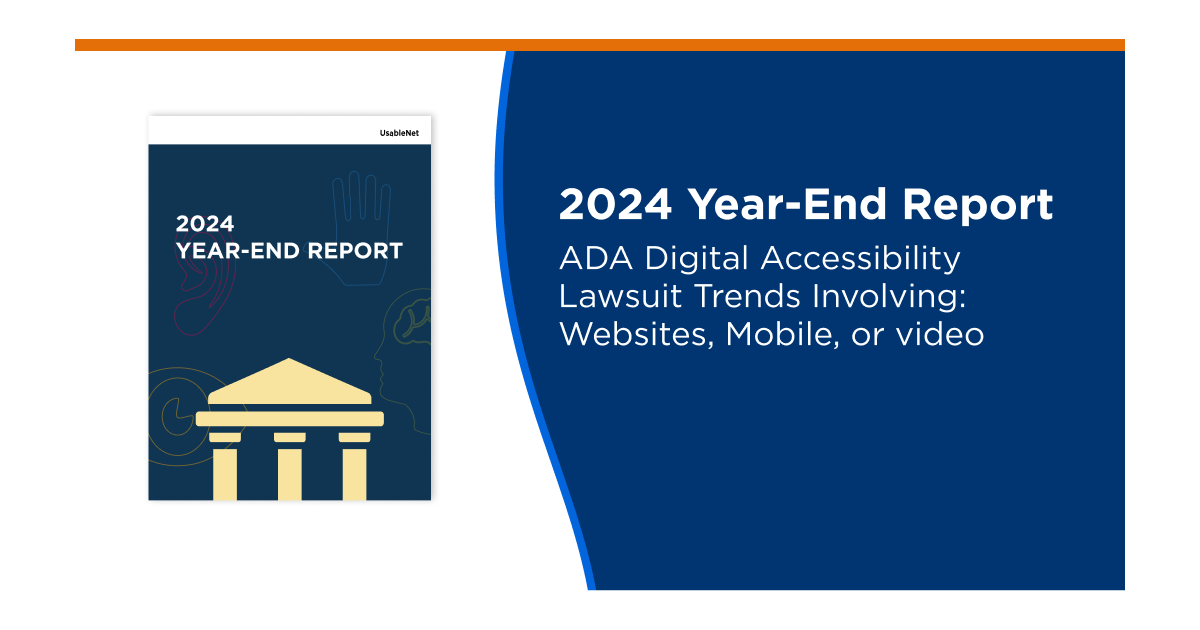The Americans with Disabilities Act (ADA) turns 32 this month!
Over the past 30 years, the internet has become more widespread and essential in our day-to-day lives. This blog looks at ADA-based lawsuits for digital accessibility more than 30 years after the act was signed. We share high-level insights from reviewing thousands of ADA-based cases for digital accessibility and how you can learn more.
What's Happening with ADA Lawsuits in 2022
In 2022, ADA-based lawsuits for digital are on the rise. If lawsuit filings continue at the current rate, we'll have another record-breaking year, according to midyear 2022 data. The UsableNet data and research team reviews hundreds of website and app accessibility lawsuits filed in federal courts under ADA and California and New York state courts for our bi-annual lawsuit report.
Viewing thousands of ADA-based lawsuits for digital accessibility, we've noticed some key trends in ADA accessibility lawsuits around digital inclusion. To name a few:
- The vast majority are currently being filed by visually impaired plaintiffs who use screen readers. Unfortunately, these plaintiffs can't complete everyday tasks on the website or app.
- ADA-based lawsuits for digital accessibility also usually cite WCAG violations and reference a lack of an accessibility statement on the site.
- People with auditory disabilities also file some of the lawsuits for digital accessibility we've seen in the last couple of years, especially when videos lack closed captioning or transcription.
How the DOJ's Actions IMPACT ADA Lawsuit Numbers
Or maybe a better question is: how does the DOJ's inaction impact ADA lawsuit numbers for digital accessibility. Over the past few years, courts have been flooded with ADA website compliance lawsuits. And the courts have been inconsistent in deciding whether or not Title III applies to websites and mobile apps.
At a high level, some jurisdictions have ruled that a nexus is required. Other jurisdictions have not. These inconsistencies make it hard for businesses and website owners to know what to do.
So, why are web accessibility and compliance rulings in the courts in the first place?
There is no formal legislation about website accessibility. What we do have is the ADA title III and the actions of the DOJ. The DOJ sided with plaintiffs in many cases from 2000-2015, establishing that websites and apps were subject to the ADA.
Yet, the DOJ has neglected to rule on these issues since 2017, when the Trump administration put the project on the "inactive list."
So, in the meantime, plaintiffs are filing suits in record numbers, increasing from just 57 in 2015 to 4,055 lawsuits filed in 2021. As a result, businesses are very much at risk if they have any digital presence.
Earlier this year, the DOJ issued some new guidance around websites and ADA compliance— but it did not clear much about what businesses practically need to do. However, the creation of guidance may mean that the DOJ is again paying attention to digital accessibility.
What Can you Do if you receive an ADA Accessibility LAwsuit?
If you have received a lawsuit or even a claim letter, don't sit on it. Instead, speak with a lawyer experienced in ADA litigation, specifically for digital accessibility.
UsableNet partners with many lawyers in this area, and we can point you in the right direction; feel free to contact us.
When you speak with your lawyer, they may advise you about possible defenses to any claims you might receive. These can include the following:
- Mootness— the problem was already fixed, and the defendant will ensure continued compliance.
- Lack of personal jurisdiction
- Failure to state a claim, including failure to plead a nexus, lack of specificity regarding barriers of access, or lack of standing
[To our legal friends reading this blog, let us know what you might add. If you're looking for a technology partner to help a client with digital accessibility, UsableNet collaborates closely with defense counsel. Watch this webinar for legal professionals to learn more].
No matter how mature your diversity, equity, and inclusion program might be, the practicalities of digital accessibility and inclusion can sometimes seem overwhelming.
One way to handle that and get to work is to think about your accessibility program in three phases: Fix high-risk issues and understand the current state of your digital presence; complete core remediation and build awareness and processes for web accessibility within your organization; and plan for the future with ongoing monitoring.
We explain more in our free e-book, Web Accessibility: Your Roadmap to Building Inclusive Digital Experiences. Click here to read the free e-book on our 3-phased approach.
Learn more about ADA lawsuits and accessibility
A trusted partner can help you improve accessibility and reduce legal risk. Contact us for a free consultation with an accessibility expert.
We're sharing more about ADA lawsuits and what businesses need to know from our 2022 midyear report in a new, free Webinar on July 27th.
Join us on July 27th at 12 ET for 2022 ADA Lawsuit Report: Insights for Business Leaders.
UsableNet will be joined by co-host Nick Pujji, Employment and Labor partner at Dentons. The Dentons team, led by Nick, has assisted hundreds of clients with website accessibility/closed captioning lawsuits/demand letters across the country.
This webinar will cover:
- Trends of ADA lawsuits by industry, annual revenue, and states where you may be doing business
- How a small number of plaintiff firms are using the WCAG to file thousands of lawsuits against businesses
- Industries named by new guidance on ADA from the DOJ and what that could mean for you legally
- How to get started with web accessibility and compliance
If you made it to the end of this blog, you should sign up for next week's webinar now!
Space is limited, and you won't want to miss this! Save your seat for July 27th at 12 ET for 2022 ADA Lawsuit Report: Insights for Business Leaders










